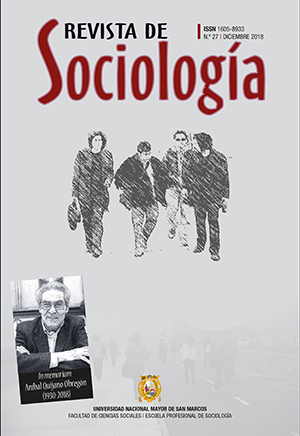Time poverty: changes in the allocation of time of women miners in extractive industries zones
DOI:
https://doi.org/10.15381/rsoc.v0i27.18961Keywords:
Use of time, mining, women, developmentAbstract
The employment of local people in mining projects is constantly documented as a factor of progress and an indicator of development, which generates higher incomes and —hence— greater well-being. Under these assumptions, we need to ask ourselves what do we mean by development, welfare and progress? Is the employment rate an effective indicator of these variables? What impact does a gender differentiation in recruitment creates? It is in this sense that the question that motivates the present investigation arises: In what way does the presence of a mining company alter the division of tasks for the families of the neighboring areas? This research seeks to study, from the approaches provided by the Sociology of Development, the change in the use of women’s time in areas with the presence of extractive industries, illustrating it with the case of the Las Bambas mining project in Apurímac, Peru.
Downloads
Published
Issue
Section
License
Copyright (c) 2018 Alejandra Brizio

This work is licensed under a Creative Commons Attribution-NonCommercial-ShareAlike 4.0 International License.
AUTHORS RETAIN THEIR RIGHTS:
a. Authors retain their trade mark rights and patent, and also on any process or procedure described in the article.
b. Authors retain their right to share, copy, distribute, perform and publicly communicate their article (eg, to place their article in an institutional repository or publish it in a book), with an acknowledgment of its initial publication in the Revista Sociología.
c. Authors retain theirs right to make a subsequent publication of their work, to use the article or any part thereof (eg a compilation of his papers, lecture notes, thesis, or a book), always indicating its initial publication in the Revista Sociología (the originator of the work, journal, volume, number and date).
























